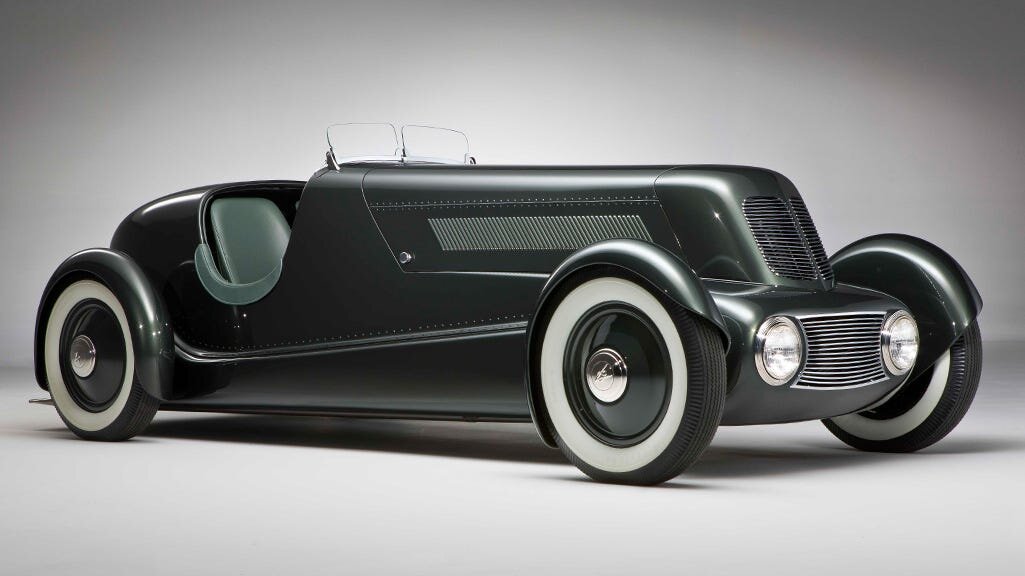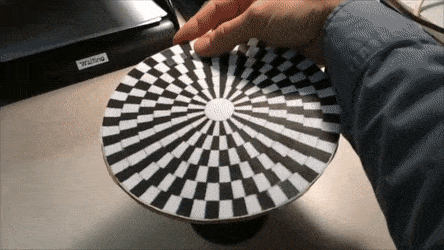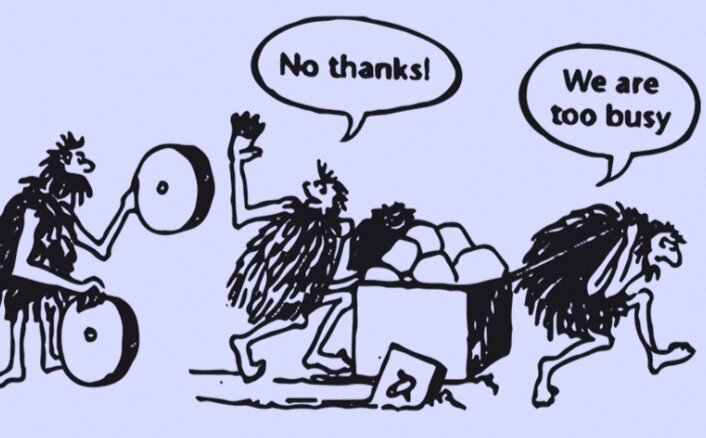By The Landlord
“My thoughts are whirled like a potter's wheel; I know not where I am nor what I do … The wheel is come full circle.” – William Shakespeare
“The wheel of fortune turns round incessantly, and who can say to himself, I shall today be uppermost.” – Confucius
“History is a wheel, for the nature of man is fundamentally unchanging. What has happened before will perforce happen again.” – George R. R. Martin
“The greatest inventors are unknown to us. Someone invented the wheel – but who?” – Isaac Asimov
“So man, who here seems principal alone,
Perhaps acts second to some sphere unknown
Touches some wheel, or verges to some goal;
'Tis but a part we see, and not a whole.” – Alexander Pope
“so much depends
upon
a red wheel
barrow … – William Carlos Williams
Time for a spin? It’s possible to turn thoughts and perceive almost everything in life as a wheel. From the revolution of planets, the turning of the seasons, fortune and fate, all down to circularities of conception, emotion and action. Within every larger cog a smaller one turns. But this week’s lyrical topic is not only metaphorical, but also of course literal. Your own thoughts might turn to anything from vehicles and their steering wheels, potter’s wheels, instruments of torture, ferris wheels, hamster wheels, colour wheels, circles of fifths, or even Wagon Wheels.
The latter takes me back to childhood. I’ve spent a good proportion of my life wheeling about, mainly on a bike, since may very first exciting gift as as a toddler, though my first full escape vehicle was a Raleigh Grifter, not, sadly, the that much prized model from the scorching hot 1970s summers, the Chopper.
Chopper. A cool and comfy set of wheels?
I’ve often imagined it would be great if we had evolved wheels instead of legs, but perhaps there’s a great wisdom in foot over skate, as perhaps we might all have died by now if, like a local guy I know, if we all rollerbladed in and out of shops at breakneck speed, or onto the back of vehicles, or whizzed around on pavements like a hoody Toad of Toad Hall or the Crazy Frog, on electric scooters. Is that the new direction we’re evolving?
Still, there’s something joyous about being able to switch to rotating motion mode. Among my very favourite of books is that masterpiece, Flann O’Brien’s The Third Policeman, in which that very thought has wheels. In this wonderful book, several characters in that Irish village setting are described to have partly swapped atoms with their bicycles due the amount of time spent upon them. The postman, for one, has become 71% bicycle and, like many other locals, has developed key behavioural traits as notable characteristics of this partial metamorphosis. “When a man lets things go so far that he is more than half a bicycle, you will not see him so much because he spends a lot of his time leaning with one elbow on walls or standing propped by one foot at kerbstones.”
And an even more fantastical idea comes in The Amber Spyglass, from Philip Pullman's His Dark Materials trilogy, where stone age-type elephant-like creatures, the mulefa, have evolved natural axles at the end of their legs, onto which they join giant seed pods grown on trees as trundling wheels. Not quite as smooth as this …
Nice set of wheels: 1932 Ford Speedster
Cars and driving has been a previous topic, but there’s plenty more where that came from. Some of our Song Bar guests are already arriving, and one person has already had a few too many. Bars and driving aren’t happy bedfellows. There’s a loud crash, and here’s country music’s George Jones: “I lay my head on the wheel and the horn begins honking, the whole neighbourhood knows that I'm home drunk again.”
“He’s not the kind of wheel you fall asleep at,” adds Tom Waits at the piano, with a smile.
“Well,” says Bob Dylan. “Sometimes you get out from behind the wheel and let someone else step on the gas. “Feel like a broke-down engine, ain't got no drivin' wheel. You all been down and lonesome, you know just how a poor man feels.”
Some people go crazy for wheels, and that even includes wheels of cheese. See how they run after such a prize in the marvellous annual Cheese Rolling Contest on Cooper’s Hill near Gloucester.
Wheels are a great way to conceive and learn ideas as well as reference them. In art the colour wheel is the water colourist’s friend, as there are also digital versions.
And for anyone trying to learn the relatives of musical keys and chords, the circle of fifths is a vital wheel.
Wheels can also be a key component of the odder musical instrument. The hurdy gurdy is the best known among these, but then in a more avant-garde conception, where art meets music, is Swiss artist Jean Tinguely’s Méta-Harmonie II, an ever-revolving mass of extraordinary sounds:
A more energetic and recent wheel-based instrument is the Marble Machine built and composed by Martin Molin, where large wooden cogs and 2000 marbles help to propel the music:
And wheeling their way in to the Bar this week are a load of guests eager to share their literal or metaphorical wisdom on the subject. The wheel of fortune idea is timeless, and joining Confucius and George RR Martin on their table, is Juvenal: “Fortune can, for her pleasure, fools advance, And toss them on the wheels of Chance."
And Herodotus: “Men’s fortunes are on a wheel, which in its turning suffers not the same man to prosper for ever.”
“Everything comes in circles ... The old wheel turns, and the same spoke comes up. It's all been done before, and will be again,” says Arthur Conan Doyle, without a hint of mystery. Certainly the wheels of this particular metaphor certainly keep turning around and around.
And here’s Croesus: "There is a wheel on the affairs of men revolve and its mechanism is such that it prevents any man from being always fortunate."
Also joining them for a Jack Daniels or three, an author who must sure be rich as Croesus, is Stephen King: “Life is like a wheel. Sooner or later, it always come around to where you started again.”
From Jack Daniels then, to Jack Nicholson, who is also here, joining them for a beer, and grinning in his sunglasses: "We live, we die, and the wheels on the bus go round and round.”
That song, hopefully is not one that will make the final lists, Jack.
From another of my favourite books, John Kennedy Toole’s A Confederacy of Dunces, we hear the words of the extraordinary character Ignatius C Reilly, who puts the metaphor in his own comical, erudite fashion:
“Oh, Fortuna, blind, heedless goddess, I am strapped to your wheel,' Ignatius belched, 'Do not crush me beneath your spokes. Raise me on high, divinity … So we see that even when Fortuna spins us downward, the wheel sometimes halts for a moment and we find ourselves in a good, small cycle within a larger bad cycle. The universe, of course, is based upon the principle of the circle within the circle. At the moment, I am in an inner circle. Of course, smaller circles within this circle are also possible.”
Ignatius has spoken of spokes, but so also has Ray Charles: “There are many spokes on the wheel of life. First, we're here to explore new possibilities.”
That’s indeed correct, and you always have to be positive. Aesop is here too, and joins Ray with some encouragement. “Put your shoulder to the wheel,” he says.
Hurdy gurdy
What elevated company. “Blessed is he who talks in circles, for he shall become a big wheel,” says Frank Dane, mischievously.
But in the other side of that spinning wheel, it’s a competitive world, and as the saying goes, "the squeaky wheel gets the grease”. We’ve all known people like that. I can think of one very pushy, sharp-elbowed newspaper colleague who was exactly like that, using sharp elbows and stepping on heads to get ahead. And her voice was high and squeaky too. If only it was more often true what Victor Gold says: “The squeaking wheel doesn't always get the grease. Sometimes it gets replaced."
But how do you use the wheel to progress? “The best time to expand is when people are asleep at the wheel,” Barbara Corcoran. But that process is rarely fair. She adds, with a nice twist: "The wheels of justice - they're square wheels."
Square wheels or round, you’ve still got to put yourself out there to progress. And it’s all very well talking about it, but moving forward is the only way to back it up. "Words without action are like wheels without traction. It is how you live that counts,” says Geoff Thompson
“Well, I like to keep my wheels on the ground,” says Marianne Vos, cleverly mixing up her epigrams to fit this topic.
Arguably it’s important to still try to be yourself when clambering on the wheel of fortune. A nice new take on the wheel metaphor comes from the American author and poet Criss Jami, in Venus in Arms: “In order to share one's true brilliance one initially has to risk looking like a fool: genius is like a wheel that spins so fast, it at first glance appears to be sitting still.”
Sitting still, or even moving in the other direction. This is known as the wagon wheel effect, and optical illusion:
Wagon feel effect: like many things, working in the inner circles
The wagon wheel effect is also a good metaphor for history, in which things can also go backwards, but is almost impossible to control. “He who puts out his hand to stop the wheel of history will have his fingers crushed, says Lech Walesa.
But what keeps the great wheel turning? “Blood alone moves the wheels of history,” reckons Martin Luther.
“Universal happiness keeps the wheels steadily turning, truth and beauty can’t,” is Aldous Huxley's take.
"Revolution means turning the wheel,” says Igor Stravinsky, who witness huge political revolutions, but utterly changed the musical landscape on his own.
“Money greases the wheel of American democracy and corrupts it all,” says Andy Dunn. Ain’t that right.
Whatever drives it, the wheel is forever push along because that’s in our nature, according to Robert Browning: “Like dogs in a wheel, birds in a cage, or squirrels in a chain, ambitious men still climb and climb, with great labor, and incessant anxiety, but never reach the top.”
Whoever invented the wheel, and as Asimov suggests, we’ll never know who, but they certainly changed, and accelerated history. Imagine if they hadn’t. Are we back the square one again?
What a bunch of squares
But can you really reinvent the wheel? Umberto Eco likens the impossibility of this to other objects. “The book is like the spoon, scissors, the hammer, the wheel. Once invented, it cannot be improved. You cannot make a spoon that is better than a spoon... The book has been thoroughly tested, and it's very hard to see how it could be improved on for its current purposes.”
But many of us try, and that’s a worthy task. “You don't have to invent the wheel, but you might want to be the company that invents the rims,” says MC Hammer. Can’t touch that!
“Yes, you can’t reinvent the wheel. But you can put your own spin on it,” adds Lauren Beukes.
So then, learned visitors and regulars, it’s now time to put your own spin on this topic in the form of song suggestions. Checking the how true your rims are, and watching the wheels go round, I’m delighted to welcome this week’s wonderful wheelwright, the perfectly true ParaMhor! Place your songs in comments below for deadline this coming Monday’s last orders at 11pm UK time, for playlists published next week. I’m sure, it one way or another it will be revolutionary.
New to comment? It is quick and easy. You just need to login to Disqus once. All is explained in About/FAQs ...
Fancy a turn behind the pumps at The Song Bar? Care to choose a playlist from songs nominated and write something about it? Then feel free to contact The Song Bar here, or try the usual email address. Also please follow us social media:: Song Bar Twitter, Song Bar Facebook. Song Bar YouTube, and Song Bar Instagram. Please subscribe, follow and share.
Song Bar is non-profit and is simply about sharing great music. We don’t do clickbait or advertisements. Please make any donation to help keep the Bar running:









